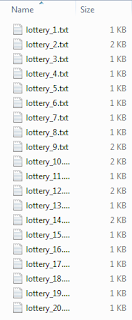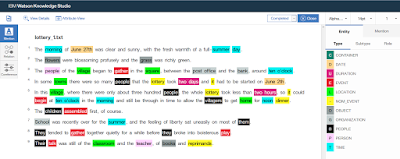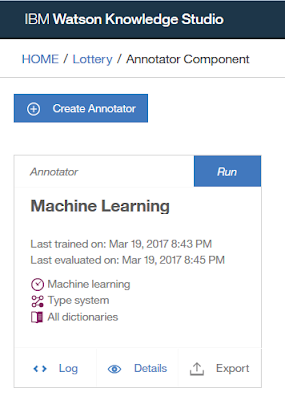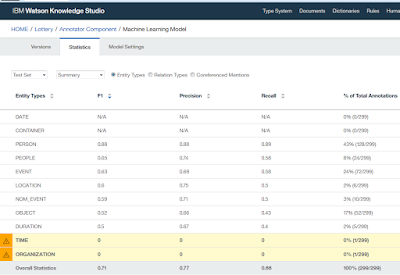For demo purposes I chose to identify personal relationships in Shirley Jackson's 1948 short story The Lottery. This is a haunting story about a small village and its mindless adherence to an old, and tragic tradition. I chose it because 1) it's short and 2) it has clear person relationships like brothers, sisters, mothers, and fathers. I added a few other relations like AGENT_OF (which amounts to subjects of verbs) and X_INSIDE_Y for things like pieces of paper inside a box.
Caveat: This short story is really short: 3300 words. So I had no high hopes of getting a good model out of this. I just wanted to go through an entire machine learning work flow from gathering text data to outputting a complete model without writing a single line of code. And that's just what I did.
WORK FLOW
I spent about 30 minutes prepping the data. E.g., I broke it into 20 small snippets (to facilitate test/train split later), I also edited some quotation issues, spelling, etc).
It uploaded into WKS in seconds (by simply dragging and dropping the files into the browser tool). I then created a Type System to include entity types such as these:
And relation types such as these:
I then annotated the 20 short documents in less than two hours (as is so often the case, I re-designed my type system several times along the way; luckily WKS allows me to do this fluidly without having to re-annotate).
Here's a shot of my entity annotations:
Here's a shot of my relation annotations:
I then used these manually annotated documents as ground truth to teach a machine learning model to recognize the relationships automatically using a set of linguistic features (character and word ngrams, parts-of-speech, syntactic parses, etc). I accepted the WKS suggested split of documents as 70/23/2:
I clicked "Run" and waited:
The model was trained and evaluated in about ten minutes. Here's how it performed on entity types:
And here's how it performed on relation types:
This is actually not bad given how sparse the data is. I mean, an F1 of .33 on X_INSIDE_Y from only 29 training examples on a first pass. I'll take it, especially since that one is not necessarily obvious from the text. Here's one example of the X_INSIDE_Y relation:
So I was able to train a model with 11 entity types and 81 relation types on a small corpus in less than three hours start to finish without writing a single line of code. I did not program Watson. I taught it










3 comments:
A minor point is that haven't really taught Watson until you take the extra step of deploying the trained model to a service like the discovery service or natural language understanding. Maybe you could add those steps?
Second, a pointer to a github with your cleaned up files would be helpful, along with an export of your type system and either your annotated files or a list of what you annotated in the files. These would help with replicating your experience.
Third, there are a few places where it might be nice to add a quick word or two saying how you got to depicted features, just to leave a few more breadcrumbs for someone using your intro as a tutorial. Things like how you got to type system editor or accuracy report.
Good intro, these could help convert to great and well-used tutorial.
John, good points. Thanks for the input. When I get some free time I'll revise. I particularly like the idea of placing resources on Github for replication. I'm a big believer in open data and replication. Great suggestion. Thanks!
It's really nice and easy to understand abou IBM watson, you should write more, people will like it.
ibm watson
Post a Comment